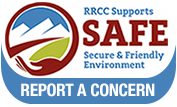Red Rocks Community College Procedure
Red Rocks Community College Procedure
| Category: | College Personnel | ||
| Title: |
Sexual Misconduct Procedure for Employees, Students and Volunteers |
||
| Number: | RRPR/HROG 3-120a | Approved: | 05/09/12 |
| Effective: | 05/09/12 | Revised: | 04/08/14 |
|
|
|||
| Reference: |
Board Policy (BP) 3-120 Affirmative Action/Anti-Discrimination; BP 4-120 Prohibition of Discrimination or Harassment; System President’s Procedure (SP) 3-120a and SP 4-120a Sexual Misconduct Procedure; SP 3-50b and SP 4-31a Civil Rights Grievance and Investigation Process for Employees and Students |
||
| Purpose: | In the interest of equitable and efficient operation of Red Rocks Community College (RRCC), employees of the College shall be afforded a mechanism by which civil rights grievances can be investigated, acted upon, and resolved at the earliest opportunity. | ||
| Scope: |
This procedure applies to all Administrators/Professional Technical employees, Faculty and Adjunct Instructors, Classified employees (CCCS employees), students, authorized volunteers, guests and visitors within the Colorado Community College System (CCCS). |
||
| Attachment: | Incident Report | ||
|
|
|||
|
|
Application
When the accused party (respondent) to a discrimination and/or harassment complaint is a student within the Colorado Community College System (CCCS) System President’s Procedure (SP) 4-31a will apply. When the respondent to a discrimination and/or harassment complaint is an Administrator/Professional Technical employee(s), Faculty and Adjunct Instructor(s), Classified employee(s), hourly employee(s), which would include student hourly’s and work-study’s (CCCS employees), authorized volunteer(s), guest(s) or visitor(s) within CCCS, SP 3-50b will apply.
Basis
Board Policy (BP) 3-120 and BP 4-120 provides that RRCC employees and students shall not be subjected to unlawful discrimination and/or harassment on the basis of sex/gender, race, color, age, creed, national or ethnic origin, physical or mental disability, veteran status, pregnancy status, religion, genetic information, gender identity, or sexual orientation in its employment practices or educational programs and activities. https://www.cccs.edu/bp-3-120-affirmative-action-anti-discrimination/ https://www.cccs.edu/bp-4-120-prohibition-of-discrimination-or-harassment/ When a complainant(s) and respondent(s) are employees, authorized volunteers, guests or visitors, RRCC will comply with Title VII of the Civil Rights Act of 1964. When a complainant(s) and/or respondent(s) is a student, RRCC will comply with Title IX of the Education Amendments of 1972 (Title IX).
Procedure: This RRCC procedure should be applied to all civil rights grievances.
Please refer to: http://www.rrcc.edu/human-resources/procedures/RRPR3-50b Introduction:
The RRCC community has the right to be free from sexual violence. All members of the RRCC community are expected to conduct themselves in a manner that does not infringe upon the rights of others. RRCC believes in a zero tolerance policy for sex/gender-based misconduct. When an allegation of misconduct is brought to an appropriate administrator’s attention, and a respondent is found to have violated this policy, serious sanctions will be implemented to reasonably ensure that such actions are never repeated. This procedure has been developed to reaffirm these principles and to provide recourse for those individuals whose rights have been violated. This procedure is intended to define RRCC expectations and to establish a mechanism for determining when those expectations have been violated.
Definitions:
Complainant(s) is a person who is subject to the alleged sex misconduct or related retaliation. For purposed of this procedure, a complainant can be an RRCC Employee(s), student(s), authorized volunteer(s), guest(s), or visitor(s). Respondent is a person whose alleged conduct is the subject of a complaint. For purposes of this procedure, a respondent can be an RRCC Employee(s), student(s), authorized volunteer(s), guest(s), or visitor(s). Sexual Misconduct offenses 1 include, but are not limited to:
Sexual Harassment is:
There are three types of Sexual Harassment:
The determination of whether an environment is “hostile” must be based on all of the circumstances. These circumstances could include, but are not limited to:
Discrimination is any distinction, preference, advantage for or detriment to an individual compared to others that is:
based upon an individual’s actual or perceived sex/gender, race, color, age,creed, national or ethnic origin, physical or mental disability, veteran status,pregnancy status, religion, genetic information, gender identity, or sexual orientation, that is so severe, persistent or pervasive, and that unreasonably interferes with or limits: • Employee’s employment conditions or deprives the individual of employment access or benefits. • Student’s ability to participate in, access, or benefit from the college’s educational program or activities. • Authorized volunteers’ ability to participate in the volunteer activity. • Guests and visitors’ ability to participate in, access, or benefit from the college’s programs.
Discriminatory Harassment is detrimental action based on:
an individual’s actual or perceived sex/gender, race,color, age, creed, national or ethnic origin, physical or mental disability, veteran status, pregnancy status, religion, genetic information, gender identity, or sexual orientation, which is: • severe, persistent or pervasive that it unreasonably interferes with or limits: • Employee’s employment conditions or deprives the individual of employment access or benefits. • Student’s ability to participate in, access, or benefit from the college’s educational program or activities. • Authorized volunteers’ ability to participate in the volunteer activity. • Guests and visitors’ ability to participate in, access, or benefit from the college’s programs.
Retaliatory Harassment is:
any adverse employment or educational action taken against a person because of the person’s perceived participation in a complaint or investigation of discrimination or sexual misconduct. Examples of Sexual Harassment include, but are not limited to:
While a particular interaction must be offensive to both a reasonable person and to the complainant to be defined as harassment, RRCC employees and other persons of authority should be sensitive to questions about mutuality of consent that may be raised and to the conflict of interests that are inherent in personal relationships that result from professional and educational interactions. Harassment is particularly damaging when it exploits the educational dependence and trust between students and faculty/staff. When the authority and power inherent in faculty/staff relationships with students, whether overtly, implicitly, or through misinterpretation, is abused in any way, there is potentially great damage to the individual student, to the accused individual, and to the climate of the institution. It is the policy of the State Board for Community Colleges and Occupational Education that none of its employees or its Board members shall engage in any activity or relationship that places them in a conflict of interest between their official activities and any other interest or obligation. Conflict of interest requires all employees to disqualify themselves from participating in a decision when a personal interest is present; therefore, SP 3-70a, Relationships, requires all employees involved in an amorous relationship to excuse themselves from any authority or evaluative role with respect to the other person. Please refer to SP 3-70a for more information and disclosure requirements. http://www.cccs.edu/wp-content/uploads/2013/09/SP3-20a.pdf
Non-consensual sexual contact is:
Non-consensual sexual intercourse is:
Consent must be clear, knowing and voluntary. Consent is active, not passive. Silence, in and of itself, cannot be interpreted as consent. Consent can be given by words or actions, as long as those words or actions create mutually understandable clear permission regarding willingness to engage in (and the conditions of) sexual activity. Also, in order to give effective consent, one must be of legal age. Further, consent to any one form of sexual activity cannot automatically imply consent to any other forms of sexual activity. Previous relationships or prior consent cannot imply consent to future sexual acts. Force is the use of physical violence and/or imposing on someone physically to gain sexual access. Force also includes threats, intimidation (implied threats) and coercion that overcomes resistance or produces consent. Coercion is unreasonable pressure for sexual activity. Coercive behavior differs from seductive behavior based on the type of pressure someone uses to get consent from another. When someone makes clear to you that they do not want sex, that they want to stop, or that they do not want to go past a certain point of sexual interaction, continued pressure beyond that point can be coercive. Sexual activity with someone whom one should know to be—or based on the circumstances should reasonably have known to be—mentally or physically incapacitated (by alcohol or other drug use, unconsciousness or blackout), constitutes a violation of this procedure. Incapacitation is a state where someone cannot make rational, reasonable decisions because they lack the capacity to give knowing consent. Incapacitation could result from mental disability, sleep, involuntary physical restraint, or from the ingestion of rape drugs. Possession, use and/or distribution of any of these substances, including, but not limited to Rohypnol, Ketamine, GHB, Burundanga, etc. is prohibited, and administering one of these drugs to another person is a violation of this policy. More information on these drugs can be found at http://www.911rape.org/ Having sex with someone whom you know to be, or should know to be, incapacitated (mentally or physically) is a violation of this procedure. Use of alcohol or other drugs will never function as a defense to a violation of this procedure. Sexual exploitation occurs when anyone takes non-consensual or abusive sexual advantage of another for his/her own advantage or benefit, or to benefit or advantage anyone other than the one being exploited, and that behavior does not otherwise constitute one of other sexual misconduct offenses. Examples of sexual exploitation include, but are not limited to:
Title IX Coordinator(s) is the employee designated by the college president to oversee all civil rights complaints, including sexual misconduct, when students are complainants and/or respondents. The RRCC Title IX Coordinator’s responsibilities include, but need not be limited to:
The Title VI and Title VII/Equal Opportunity Coordinator(s) (EO Coordinator) is the employee designated by the college president to oversee all civil rights complaints, including sexual misconduct, when employees are both the complainant and the respondent. The EO Coordinator’s responsibilities include, but need not be limited to:
Jurisdiction - College grievance proceedings may be instituted over incidences that occur or are related to College or college-sanctioned activities or was of such a nature to impact upon the college.
Complaint Procedures
RRCC can only respond to allegations of misconduct if it is aware of the misconduct. Further, RRCC can more effectively investigate the sooner the allegation is brought to its attention. Any employee, student, authorized volunteer, guest or visitor who believes that he or she has been subjected to sexual misconduct, or believes someone else a part of the RRCC community is being subjected to sexual misconduct, shall contact:
Anyone can request advice and information about possible ways to proceed and to put the college on notice. RRCC shall investigate complaints pursuant to SP 3-50a and RRPR 3-50a and SP 4-31a, Civil Rights Grievance and Investigation Process for Employees and Students. http://www.rrcc.edu/hr/policies/procedures/RRPR3-50b.htm http://www.cccs.edu/wp-content/uploads/2013/09/SP-3-50a.pdf https://www.cccs.edu/wp-content/uploads/documents/SP4-31.pdf
To Report a Complaint Confidentially
If one desires that details of the incident be kept confidential, they should speak with the RRCC mental health counselors or off-campus rape crisis resources who can maintain confidentiality. The RRCC mental health counselors are available to help you free of charge, and can be seen on emergency basis. In addition, you may speak on and off-campus with members of the clergy and chaplains, who will also keep reports made to them confidential. More information is available on the RRCC Counseling Services page.
Reporting an Incident of Sexual Misconduct Employee’s Obligation to Report
RRCC employees have an ethical obligation to report any incidences they are aware of concerning discrimination and/or harassment. If the employee is unsure, s/he may direct their questions to the Human Resources director at the college. Failure to report will be considered a violation of BP 3-70, Colorado Community College System Code of Ethics, and may result in discipline, up to and including termination.
Reporting a Complaint
In order to take appropriate corrective action, RRCC must be aware of discrimination, harassment and related retaliation that occurs in RRCC employment and educational programs or activities. Therefore, anyone who believes s/he has experienced or witnessed discrimination, harassment or related retaliation should promptly report such behavior to the Title IX and/or EO Coordinator. The Title IX/EO Coordinator contact information for RRCC is: Deborah Houser
Clery Act-Federal Statistical Reporting Obligations
Certain campus officials have a duty to report criminal misconduct, including sexual misconduct, for federal statistical reporting purposes (Clery Act). All personally identifiable information is kept confidential, but statistical information must be passed along to campus law enforcement regarding the type of incident and its general location (on or off-campus, in the surrounding area, but no addresses are given) for publication in the annual Campus Security Report. This report helps to provide the community with a clear picture of the extent and nature of campus crime, to ensure greater community safety. Mandated federal reporters include: student/conduct affairs, campus law enforcement, local police, coaches, athletic directors, residence life staff, student activities staff, human resources staff, advisors to student organizations and any other official with significant responsibility for student and campus activities. The information to be shared includes the date, the location of the incident (using Clery location categories) and the Clery crime category. This reporting protects the identity of the victim and may be done anonymously.
Clery Act-Federal Timely Warning Reporting Obligations
Victims of sexual misconduct should also be aware that college administrators must issue immediate timely warnings for incidents reported to them that are confirmed to pose a substantial threat of bodily harm or danger to members of the campus community. The college will make every effort to ensure that a victim’s name and other identifying information is not disclosed, while still providing enough information for community members to make safety decisions in light of the danger. The reporters for timely warning purposes are exactly the same as detailed at the end of the above paragraph. For more information on Clery Act reporting requirements please contact the Interim Chief of Police Anthony Schaller, 13300 West Sixth Avenue, Lakewood, CO, 80228. 303.914.6498. anthony.schaller@rrcc.edu Initial Response to Allegations of Sexual Misconduct
RRCC reserves the right to take whatever measures it deems necessary in response to an allegation of sexual misconduct in order to protect employee and students’ rights and personal safety. Such measures include, but are not limited to:
Sanction Statement
Not all forms of sexual misconduct will be deemed to be equally serious offenses, and RRCC reserves the right to impose different sanctions, ranging from verbal warning to expulsion, dismissal, termination, or no-trespass order, depending on the severity of the offense. RRCC will consider the concerns and rights of both the complainant and the respondent. Employees found to be in violation of the sexual misconduct procedure will be sanctioned up to and including termination. All sanctioning will be in accordance with the policies, procedures, and rules that govern. Employees found to have had actual knowledge of any sexual misconduct incidences and fails to report may be sanctioned up to and including termination. All sanctioning will be in accordance with the policies, procedures, and rules that govern. Students found to be in violation of the sexual misconduct procedure will be sanctioned up to and including expulsion. All sanctioning will be in accordance with the policies, procedures, and rules that govern. An authorized volunteer in violation of the sexual misconduct procedure will be dismissed from their volunteer duties to the college. Guests or visitors found in violation of the sexual misconduct procedure will be issued a no-trespass order stating s/he will no longer be allowed on the college campus.
Retaliatory Acts
It is a violation of this procedure to engage in retaliatory acts against any employee or student who reports an incident of sexual misconduct, or any employee or student who testifies, assists or participates in a proceeding, investigation or hearing relating to such allegation of sexual misconduct.
Revising this Procedure
This procedure defines and prohibits harassment on the basis of federal and state law as interpreted by the courts. If statutory provisions, regulatory guidance, or court interpretations change or conflict with this procedure, the procedure can be deemed amended as of the time of the decision, ruling or legislative enactment to assure continued compliance. RRCC reserves the right to change any provision or requirement of this procedure at any time and the change shall become effective immediately. |
||









